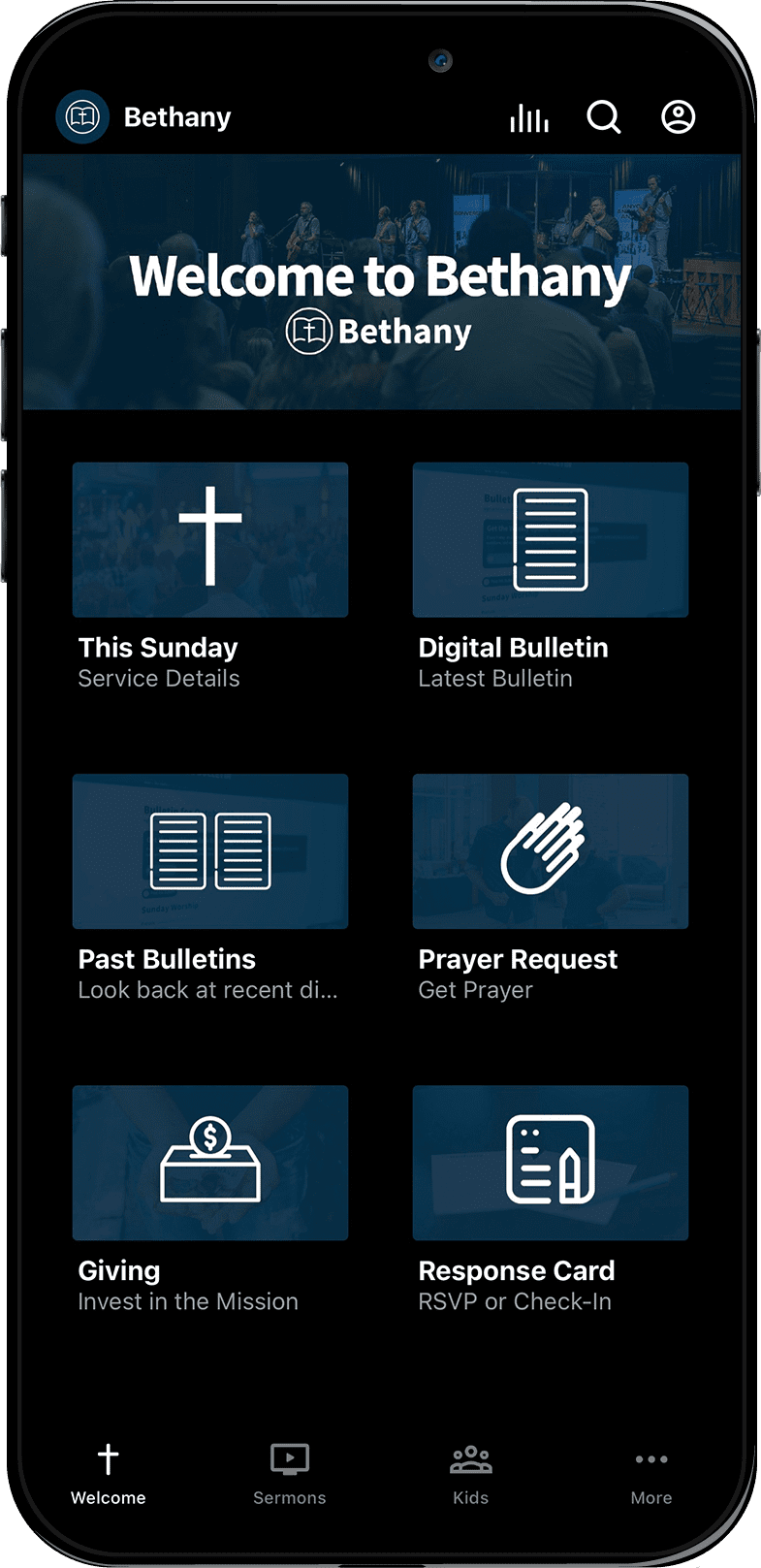In This Series
Keeping It Real
Titus 3:12-15 (ESV)
April 10, 2022
Pastor Josh Beakley
Titus chapter 3, verses 12-15. We’re finishing the letter. We’ll conclude with Paul’s ending remarks and see what God would have us to learn going forward.
12 When I send Artemas or Tychicus to you, do your best to come to me at Nicopolis, for I have decided to spend the winter there. 13 Do your best to speed Zenas the lawyer and Apollos on their way; see that they lack nothing. 14 And let our people learn to devote themselves to good works, so as to help cases of urgent need, and not be unfruitful.
15 All who are with me send greetings to you. Greet those who love us in the faith. Grace be with you all.
Certain passages are particularly dangerous to preach on. One of those passages is Luke chapter 10 where we read about the parable of the Good Samaritan. It’s a story of the most unlikely person offering practical care to someone in need. It’s designed to make a point about the kind of extravagant love that God calls his people to offer. It’s a love that we so often fail to give. It’s a dangerous passage because the application on such a topic can become very practical very quickly, particularly for the preacher. That’s what happened to my dad one week.
He was preaching a sermon from this passage in Luke 10. Then that very week, there were some visitors who arrived at the front gate there in South Africa, looking for work and food. They were two young boys from a neighboring country. They had no home or status. They were hundreds of miles away. One of the boys eventually decided to stay with our family. My parents worked hard to get him documentation, to find his family, to get him education and work. He just became a part of our family. He joined us on vacations and he had quite the personality. He was a great source of entertainment. Handsome was his name. You knew it because of the scar where when he was on the streets, he used a pen to carve it into his own forearm.
We had lots of fun memories with Handsome. Eventually, he got into body building and he thought this was what he wanted to do. He got certified as a fitness instructor. He was well-liked there at the gym. While it was a blessing worth celebrating, he also used it as an opportunity to connect with other people. There were some friends who weren’t making good choices. One night, my parents got a call. Handsome had been out with some friends and ended up in a car accident that took his life. My dad went with a fellow pastor there to identify the body. It was through that they met the city officials. They reconnected with some of Handsome’s family. They eventually met the driver. The situation left my parents heartbroken.
What was all this for? What was all this about? There is a lot of stuff that we’re not ever going to know. But one thing was exceedingly clear to all those who were there. In this country where we didn’t always belong, who are these foreign pastors? Who are these people? What is this ministry? They were watching my parents year after year. Then they come and they attend this funeral and there is something unmistakably clear that at the end of the day, this ministry, these people are about real life. This stuff is real.
Following Jesus has never been safe because real ministry means real life. If you think that Jesus is tame, that the Bible is boring, that God is a nice idea to keep in mind, then you don’t know the Jesus of the Scriptures. Jesus modeled and then calls His followers to do ministry in ways that will transform their lives forever. Following after Jesus is not just a nice sentiment. It’s not just a box that you check, a doctrinal statement or a census survey. It’s a commitment that will alter your life in real ways. It’s not just abstract theory or philosophy that is all talk and no action. If you engage with Jesus’ message for real, He will not leave you alone.
Passages like today are easy to pass by; but we dare not do that because they teach us something about how tangible real ministry is. They teach us about how God cares about the details of real life. The Bible is filled will examples of instruction about truth, but it is trust that intersects with real life. It includes not just teaching, but true accounts. These are accounts of real people in history. These are stories of men and women who took steps of faith to follow after God that incurred true genuine cost and sacrifice. Even the forms through which we receive the Scriptures, like the letters of Paul of one pastor to another, serve as ways for us to see how God works in our everyday world. Today’s passage is a fitting end to this letter with a simple but profound reminder that real ministry happens in real life.
Amidst all the doctrine and the church governance and the cultural battles and all of this chaos, sometimes we forget that real ministry involves real people in simple everyday real life. Maybe after a season of distancing and disorientation, a simple reset is helpful for us to conclude this letter with. So let’s do that. Let’s ask ourselves again, what does it look like? What does it look like to just do real life ministry? Here are a few reminders of how it might happen. We’ll try to touch on four.
#1 The Real Choices We Make (12)
These choices can sometimes be tough. They can be hard or difficult. They take great wisdom and effort and ultimately faith because there are real lives involved. There is real cost and real risk. Real life ministry means making choices that are tough because the stakes are high. We know that in life. Whether it’s a coach deciding who to put into the game or what kind of plays to run, or whether it’s a commanding officer choosing who is the most strategic soldier to send and where. It’s a tough thing just in general to make decisions about where your child is going to go for education whether while they’re at home or beyond. It’s tough just deciding what job offers to take or consider. In all these things you realize there are big implications with the direction that we go. These are tough choices we have to make. Even within the church, there are choices about what kind of ministries we’re going to be involved in, what kind of churches are we going to commit to and how are we going to live that out? These are hard choices because following after Jesus as the true king of our lives is still going to require faith to make these kinds of tough choices and they have big impacts on real life, ours and others.
When it comes to decision points in life, often we find ourselves asking what is God’s will in this? We know that His will is made known through His Word but usually, we aren’t quite satisfied with what is found in here and we want something more. We want some kind of guarantee that the direction we choose will end up in the way we want. We like to think of God a little bit more formulaic. We like to think we can kind of do our part and then He will do His. So how do we know His will to do what we want? It’s kind of like that magic 8-ball that we would shake and know what is going to happen, but we can shake it again if we don’t get the answer we want. So we try to figure out what is God’s will? What’s going to happen?
Sometimes we live a little bit like those Choose Your Own Adventure books. Do you remember those? You read and then you get to the end. There is a dragon chasing you and it says if you want to enter into the cave, then turn to page 202. If you want to run in fear, then turn to page 205. You think “Well, let’s see what happens on page 202.” You flip over and you’re like, “I don’t know. Let’s see what happens on page 205.” Then you’re kind of holding your finger in the spot and flipping around and thinking, “Which path do I want to take?” We try to do that with life. It’s not bad to plan, but we put sticky notes all over. What if we go down this road and have this kind of life? What if we go down this road and have this kind of life? How do we figure out what God wants and really what I want? We lose the fact that sometimes following Jesus is just making tough choices in faith.
I remember my mom sitting the four of us down after a few years. We were coming to church. We started following Jesus. It was very clear that there was a radical transformation in my parents. My dad was always living for Monday and then they switched to living for Sunday. We were having these business meetings where work would come over and we’d be off being babysat. Then all of a sudden, we’re having Bible Studies and everyone is coming over and we’re the babysitters. There are kids running around and we’re like, church is very different. Mom sits us down and she says, “We think God might be calling your dad to go train for ministry.” She was pretty serious. I could tell she had been wrestling with that choice. For us, it was kind of like, yes. We’ve been watching it happen. A couple years later, dad is graduating from Seminary and they sit us down again. “We think God might be calling us to Africa.” They’re really serious like this is a big, dramatic thing. We’re like, “We’ve kind of been watching that happen.” Then the first year in Africa, mom would say, “I don’t know how long God has us here.” Then the next year, “This might be the last year that we’re here.” Then the next year, she said, “I’m not sure how much longer we’ll be here.” A couple decades later (Laughter!) and they still wrestle. You can see it. This is a tough choice. “We’re not sure.” But you look and it seems obvious that God is leading you to do this.
Yet, the reality is that they’re wrestling with it because they’re trying to make a tough choice by faith. They know this affects real life. This will affect how you guys are going to grow up and where you’re going to go to school. It affects whether we can be together. It affects whether I’m going to be at your basketball games. It affects who you’re going to live with and who is going to help you through algebra. These are real life decisions that they’re making, and yet, we can look and see it seems clear that God is doing this. You have to make a choice by faith.
Then God uses the church here at Bethany, where people have hosted myself and siblings. There are also people in California. The ways that the church has worked has been a blessing, but it has not been easy. There are real hard decisions that have to be made. There is distance and now continued distance. There is distance from grandkids. It’s tough. The Wards were talking about that. We have all these missionaries and people making choices in ministry. Not just missionaries, but all over the place, we have tough choices. Real life ministry means making tough choices with wisdom, by faith. As much as we would like to imagine otherwise and think maybe I’m outside of the Bible and what I really would be doing if I knew God really well, it wasn’t different for Paul or Titus. Look at verse 12. At the very end of the letter, Paul transitions to practical real life matters.
12 When I send Artemas or Tychicus to you, do your best to come to me at Nicopolis, for I have decided to spend the winter there.
You could just fly past that verse, but I think there are a couple of tough choices involved that we can see. There are two categories typically that stand out as particularly tough to make strategic choices. These are the categories of people and places. You can see that in terms of who we know and where we go. First look at people. There are tough choices about people that Paul mentions, here. He talks about who he is going to work with and where and even whether he’s going to send them on. People can be a great blessing, God’s gift to church family and partners. Paul has ministry partners he is working with, laboring with. They’re there together. He mentions two of them; Artemas and Tychicus.
We don’t know about Artemas. He is not mentioned elsewhere. We see his name is Greek. He is clearly a trusted partner of Paul. Tychicus is someone we know a little bit more about. You can read about him in the book of Acts and then you can see references to him in Ephesians and Colossians. It seems like he carried some of these letters personally to deliver them to churches. Paul trusted him. He was a well known disciple. Paul called him
Colossians 4:7 …He is a beloved brother and faithful minister and fellow servant in the Lord.
This is someone that Paul loved. Here are these two individuals and Paul is considering sending one of them to come and bring some reinforcement to this island of Crete. Remember that Titus is a trusted individual. This is a tough ministry spot. These are guys that Paul trusts and he is willing to send to a tough place. They would have been useful for him wherever he was, but he is willing to and believes it is right to send them as reinforcements there in Crete. In fact, he is going to want Titus to come and visit him. So here are men that Paul loved and it would have been hard to spare, and he is willing to send them. But notice what he says. He is undecided.
12 When I send Artemas or Tychicus to you,
Parchment is kind of expensive. It’s not like an email where it’s like you send another follow-up email or text because you haven’t decided yet. Paul is writing the letter and he hasn’t decided yet. There are some things that are making this particular decision particularly tough. There is some kind of strategic consideration that he is still giving. “I’m not quite sure which one I’m going to send yet.” We can see Paul is wrestling with this tough choice. It’s not that he’s not trusting God. It’s just in faith he is going to need some wisdom and then just to make a decision. So he is undecided about the people that he is going to send.
We see he has a direction, but he’s going to have to make a decision by faith. Then we see also this tough choice about a place. Real life ministry means that we have to make tough choices about people, who we’re going to send, and about places, where we’re going to go and when. You see Paul saying to Titus
do your best to come to me at Nicopolis, for I have decided to spend the winter there.
Nicopolis is kind of a common name. There are a number of cities and this is probably a likely one. It’s about 200 miles northwest of Athens. So it’s likely that he was here. The Greek word Nicopolis is where we get the term Nike. It’s the idea of victory. So it’s a town of victory. This is some kind of town established by this secular government to celebrate some sort of victory. Paul says he is going to go to that place for the winter. There is a season where it is difficult to travel, so he’s going to have to be kind of stuck there for a while. It seems like for some reason, Paul identifies this as an ideal strategic base of operations. It’s a place where he can do some writing and thinking, but probably also some evangelistic ministry and have an impact. It even can position him to launch maybe strategically into Spain in the future. He wants to go where the Gospel hasn’t gone.
So he picks this place and he picks a time. He’s trying to spend the winter there, but he’s not there yet. He’s not yet there at that place. He hasn’t yet sent the person. Here’s the Scripture that we’re given. It’s sort of Paul in the middle of the decision. It’s not fully confirmed, yet. There is going to have to be some wisdom and walking by faith to make some of these tough choices. They’re going to have big impacts on people’s lives; where they’re going to live, where he is going to be, where Titus is going to be. Think about all that impact. Think about how hard it is for a pastor to come and to go and how it impacts all these people. Paul understands that. He was trying to make these decisions in faith. He knows it’s going to impact people.
Real ministry means making real choices, tough choices. It’s making tough choices about where we’re going to be and who we’re going to be with because we’re creatures and we can’t be in lots of places at the same time. We’re going to be in a certain location. We’re going to be with certain people. God is going to move people on and we have to trust Him with who He moves on when and try to make choices in faith.
With the people of the Scriptures sometimes it feels like reading backwards and that it’s so easy. “Well of course you would have done that then. Of course you know that this was going to happen.” But in the moment, it would have been incredibly terrifying. It was a decision fully made in faith. God didn’t give them the answer right away. We know what’s going to happen, but they don’t. Now here we are in the middle of walking by faith ourselves and sometimes we think we should have something else. No, we have to trust God’s Spirit and the guidance He has given us in Scripture and then use the wisdom He has given and the wisdom of wise people around us, but then make a decision by faith for His glory.
It’s not by faith saying He is going to do what I want Him to do. No, it’s by faith saying whatever He does, I trust Him. That’s a hard step to take to trust God. Because whatever our decisions with our work or with our college major that we’re going to pick or where our kids are going to go to school or where we’re going to live, we start to think if I get this right, then God will bless my life the way that I want. Yet at the end of the day, we have to just make a wise decision by faith. Whatever does happen, I trust it will be to the glory of God. These are the tough choices that Paul is making and the tough kind of choices that we have to make. These are the tough kind of choices actually that we’re entrusted.
We see our Savior who isn’t this God who stays far removed. God condescended. He came as a man. He took on flesh. Jesus came and walked steps in sandals. He lived among us making choices and walking with these disciples. He was walking by the power of the Spirit and according to the guidance of the wisdom of God. He showed us how to walk and trust God. There are key tough moments where He had to trust God. You think even of the wrongful death of your own cousin in prison. At that moment, He says “We need to go and rest.” He gets in a boat and gets His disciples and says, “Let’s go and rest.” They go and as they go to the other side, there are all these people there. There are ministry opportunities. They’re supposed to be here for rest, but He was recognizing the people that God had brought. He said “We need to do ministry.” He had compassion. He followed the Spirit of God and kept in step with God’s guidance. Even though the disciples are like, “We can’t do this. We’re out of energy. We’re out of food,” trust God. Follow Him by faith. This is what it’s going to look like.
By faith that means there are some places we can be and some places that we can’t. We have to trust God with the people that we can be with, the places that we can be and sometimes the people that we can’t be with, whether it’s because of other choices or because He has taken them from us. These are things that we have to trust God with. There is great cost. These are real impacts to people’s lives.
We entered into that season with Covid and we didn’t have a lot of virtual ministry or ways to connect. All of a sudden, we had to develop some. In God’s wisdom and timing, He brought someone that we had sent to the field back just in time to help us start to get some things off the ground and put it together. He was helping with the team. We have an amazing team, but it was a lot of work. God cared for our church really, really well. We made it through some of that season and then God calls him and his wife and moves them. We just prayed and sent them on. You might think why would we let somebody like that go? We have to let the Spirit move people where He will and trust that God will provide the people that we need. He’ll send us the places we need to go to make real life impact happen. We trust God with how He is at work. We need to be where we’re at and then also trust God with where we’re not and be faithful in those things.
There is more that could be said but at the end of the day, real ministry just means tough choices in real life. That isn’t far from ministry. That’s actually what we see in Scripture. We see it in Paul and we should expect it in our own lives because there is impact to ours and others’ lives. But those impacts actually become catalysts and special moments that thrust us into new relationships and new territories where we’ll be able to advance Christ’s kingdom in ways that we couldn’t have otherwise. So in that sense, there is
#2 The Real Help We Give (13)
Real ministry means giving true help. It’s real life help. It’s help that makes a true difference. It has an impact.
In the past few years, there is this race that has resurfaced from a couple decades ago. It’s called the eco-challenge. It’s known by some as the world’s toughest race. It’s a multi-day expedition. These teams travel for hundreds of kilometers through jungles and rivers and ocean bays and waterfalls and this kind of thing. Throughout the race, they are going through the island of Fiji. They encounter terrible weather. They lose supplies. They get hurt and face injury. There are these moments. In those moments, sometimes they turn to these Fijian locals for help and they’re welcomed with such hospitality. They are given sometimes food or drink or a place to stay or directions to go or a horse to ride. They’re helped along. There are these teams. They’re running to finish a race and they face all of this opposition. But throughout it, there is this network of support both locally and then professionally. There are others who are coming in and helping them complete the mission. It’s much broader than the individual team. Even the most equipped first place team had occasions where they relied on other people’s help. If we’re going to be about the mission that God has, He is bringing about a whole body of Christ to advance His kingdom. It means giving and receiving true help that makes a difference. It’s a beautiful picture. You see it in verse 13. It reminds us a bit of Pilgrim’s Progress, helping people along the way. Paul says to Titus
13 Do your best to speed Zenas the lawyer and Apollos on their way; see that they lack nothing.
Real life ministry means giving and receiving true help that makes a difference. You see a couple qualities of true help that stand out. First, it’s practical. True help is practical in both the support that is needed and in the skills that are offered. You see the practical support there that Paul calls Titus into. There is practical support to these two men both traveling. He says
13 Do your best to speed Zenas the lawyer and Apollos on their way;
We don’t know exactly what their mission is, but it’s likely that they are the ones carrying the letter here to Titus and delivering it. It’s likely that they are reading it there together and then they are supposed to go off and continue a mission, maybe more evangelism. Paul says to Titus to make sure they have what they need. Speed them on their way. Give them the support, whether it’s a place to stay or they need some funds or they need food. Whatever it is, make sure that they are able to continue on with this mission. Help them to continue going so they don’t get stuck. Support is needed to advance people doing ministry. But then also, practical skills are needed.
Real help is practical in terms of the skills that are offered. You see at least mentioned here that Zenas is noted for being a lawyer. It’s possible that this could be a lawyer of the Jewish law, but his Greek name could be an indication that we’re talking more about Roman law. We can’t know for sure, but it seems like this is identified by Paul and there is some practical skill that this individual came with and that he would bring wherever he is going.
It’s the same with Apollos. We see this was a very gifted individual. You can read about Apollos in the book of Acts and you can see how gifted he was as a speaker. He was so gifted a speaker and leader in fact, that some people were starting to align with him as one of the early Christian celebrities. They were saying, “He’s my guy.” Paul had to say, “Calm down.” He was such a skillful leader, but he is being sent and he is bringing that skill elsewhere for the glory of God. It’s practical in terms of his skill. It’s practical here for Zenas.
There are all kinds of practical skills that God gives to His church. There are people who have skills of all kinds. People come with different backgrounds that God brings into the church family to provide actual practical help in all kinds of ways in the moments in which it is needed. True help is practical and it’s thorough. You see the kinds of help mentioned there, but we also see the extent of the help that is asked for here at the end of verse 13.
see that they lack nothing.
It’s thorough. He’s saying to make sure that they have everything that they need. Whatever they need, just take note. Make sure that they’re not missing anything. Make sure that they don’t need more food, they don’t need something to drink, they’re not running out of funds. Make sure that they have such and such taken care of, that they have the suitcases that they need, that they get a ride where they need to go. Whatever it is, make sure that they have what they need. See that they lack nothing. Elsewhere there is the idea of see that they are able to advance in a manner worthy of someone who has been commissioned by God. See that they have been outfitted with what they need and you can continue them on this mission. Paul wants to make sure that Titus’ help is thorough and that he meets their needs.
Real ministry means giving true help. It is help that is practical and help that is thorough. There is always this danger of Christianity or a church where we kind of do what James says, where we kind of just say, “Be warm and be filled. Amen,” and then everybody kind of splits and some people are left without the help that they need. Here specifically, there are people doing ministry who are left short. They’re not able to do what God sent them to do. But there are times where James just said there are people who need help who aren’t receiving it. This religion is really just being dead and cold and all theory with no action. That’s a warning that James says. That’s dead faith. That’s not alive. It’s not living.
The Scriptures are filled with practical help in specifically this area of hospitality. Hospitality is where we care for people. Hospitality gets messy. You’re talking about taking someone and making sure that they have food and washing dishes and washing sheets. Maybe there are different forms of hospitality, but there is just some kind of messiness and costliness and difficulty to it. In fact, when we hear hospitality mentioned elsewhere, we’re called to show hospitality without grumbling. “Okay, I get it. So and so needs such and such.” You kind of do it, but you say, “Oh, they ordered the supersize.” (Laughter!) There are these things that we want to be a part of ministry, but then it just pushes us. It’s too messy or too costly or whatever it is and we’re tempted to grumble.
The thing is that true help is both practical and thorough.
I can say praise God for this church family. We’ve had such practical help and such thorough help. We’ve been a part of churches around the world where people are so faithful to bring help in ways that are real and impact. You think about all the skills that people have in a church family where they’re helping with whatever it is. Sometimes it’s building or plumbing or physicians or home repair, car repair or they’re just encouragers and they’re writing notes or they’re helping with taxes or whatever it is. My parents write and they’re saying hi and thank you. Then they usually have some kind of concluding remark where it’s like, “Hey, can you send me the tax form? Can you send me the 1099?” It is real life practical help that is needed. The church family is filled with people who are just investing and loving and bringing real life help, skill and support. It’s so precious.
We think about Gospel ministry. We want to be about Gospel ministry. We’re up here proclaiming Christ and the Gospel. Yet, the only reason that we’re able to do some of this is because people are in the nursery helping to make sure that this can happen. They’re coming and setting things up or they’re turning the power on. They’re keeping things going. There are all kinds of people bringing skill and support to make sure that Gospel ministry can happen and it’s very costly. To get missionaries overseas or to be able to support local churches or to be able to help things go on, it is costly. It is messy. Sometimes it’s inefficient. Yet true help, real ministry is like that.
Think about how difficult it is to make those things happen. It takes cost and investment. Think about our own Savior. He was so practical. He was loved by people who were practical. He was there. He wasn’t one who wasn’t able to get in the dust to wash His own disciples’ feet and to take care of practical matters. They came to Him when there was no wine. His mom came to Him when there was no wine at the wedding. They are very practical matters. He uses analogies of shepherding and farming and building. He picks fishermen and tax collectors. He understands what life is and how messy it gets. He’s so practical that when He was actually on the cross, He looks down and He sees John and He sees His mother and He said, “Behold, your mother.” He understands there is practical care that is needed. Our God is not distant. He understands real life.
He brought all this healing. He provided food. He understood those practical needs, yet He knew what was most needed was spiritual life. All those practical things were great overflows of love, but what people most needed was spiritual life. There were times when people got a little bit distracted. They said, “Keep healing.” He said, “No, I have to bring the Gospel for true life and salvation.” There was a time when He was with Mary and Martha, His good friends. Martha was getting excited about hospitality, which is a great command, and all these things. But she gets upset at Mary. Jesus said, “No, there is something of priority here. She is invested in the spiritual growth and life that is happening.” There is a point where there is a man who is laying there. He can’t get up. They bring him for healing. He says, “Your sins are forgiven.” Everybody gets all upset and He says, “Is it easier to say ‘your sins are forgiven’ or ‘get up and walk’? He tells him to get up and walk, but let me tell you, if you could pick one of those two things for Him to say to you, ‘get up and walk’ or ‘your sins are forgiven,’ I hope you pick sins forgiven. That need, that kind of help is so much more eternal and profound. It’s what we truly need and Jesus did it in a practical way. He did it in a thorough way.
Do you ever ask kids to go and clean a room or to finish their dinner? Then they’re like, “I’m done.” (Laughter!) Not quite. Do you know Jesus never did that? He was so thorough that when He had the worst cup that could ever be drunk, the wrath of God for our sins, He went to the cross and drank it down to the last drop, such that He could say, “It is finished!” and we can say, “It is finished!” Praise God for the kind of love and help that we can offer practically, but especially spiritually to advance Gospel ministry. This is real ministry. It’s real life and it brings true help. It’s the kind of help that we’re all to invest in because there are these windows of opportunity that come when clear needs arise. As they do, we want to ready ourselves to meet them before they pass. So look at
#3 The Real Needs We Meet (14)
These are real life needs. They are clear opportunities to show care. They often come without warning and they require immediate action to realize or the opportunity will be gone.
I remember it was like a normal Sunday. We were just going to church. We were kind of busy. It was kind of a nice day. I think we were going to go play Frisbee at the park or something. This was in California. There was kind of a little bit of a stir. There was an older woman who came just very gently and said she needed some help. There were some individuals gathering and we were trying to find out what was going on. She said, “I’m going to be evicted today.” So all of a sudden, we changed our plans. We rally around. There are dozens of people who are getting over there to help her move. Then we discover the depth of the true need. The reason she is being evicted becomes clear. We were working our way through piles and piles of boxes and magazines and animal feces and this house is deteriorating.
We realize that this woman has been in our church family. Praise God that she mentioned something and we were able to step in. But she had been in our church family and we had missed what has been going on in her life for a long time. We’ve missed this need. The need was so expansive in fact that it was going to require far more support than a one day effort. This was the kind of need that now we know about. It’s exceedingly clear that all of a sudden we have to make some choices about big sacrifices that we’re going to make to bring true help and to meet this need. It’s a powerful reminder of how many ministry needs are all around us that we can easily just run right on by. They are around us. The opportunities will open up and we’ll be able to see them. Are we ready for them? In the ups and downs and the chaos of life and ministry, here’s what Paul says
14 And let our people learn to devote themselves to good works, so as to help cases of urgent need, and not be unfruitful.
You think about that idea. For sure, there is a primary emphasis here not just on the needs of crisis, but of ministry that is taking place. There is an emphasis that as ministry needs come up, that we’re devoted to that. There is a commitment that we embrace such that we’re devoted so that when the time comes and there is a conflict in our schedules, we say, “No, I’m devoted to this.” We say, “I can’t take advantage of that ministry need that is so clearly brought to me by God because I’m devoted to this other thing.” Paul says, no. Our people need to be devoted to good works. We need to be devoted to the kinds of things that God would bring up, those opportunities that we dare not let pass. We should learn to be ready for those.
He mentions “our people.” I think there is a little bit of a contrast between the people who were talking, talking, talking about all of these ministry conflicts and theological discussions. Yes, there are people that just talk and they don’t do anything. But our people need to be ready to act on their theology. Be ready to actually hit real life and bring Gospel hope to people in need and then true help to people in need. This is the commitment that we embrace and the benefit we offer. This is good works. This is what we’ve been called into. We’ve been saved by grace unto good works. Christ has people all around us with ministry needs. Even though they are overwhelming, these desperate needs are opportunities to see how deeply Jesus cares.
He brought His disciples across the lake and here are all these people. They desperately need food. They’re like, this is overwhelming. I can’t handle all this. “This is an opportunity to show how deeply I care and my power.” He’ll put us to use. By faith we step into those opportunities He brings because these are the moments that we engage. These are cases, he says, of urgent need. They happen unexpectedly sometimes. They arise and they are unique opportunities of really strategic investment. All of a sudden, this instance happens where ministry impact is deep and we might not have it at another time. All of a sudden, there is this great occasion where we can invest deeply, where someone has a deep need or there is a crisis going on in another country where all of a sudden, we will make a sacrifice. Whether it’s our money or our time or our kindness, it will go so far. We can’t pass up on that opportunity of investment. The Gospel impact is so deep.
So we have these opportunities all around us because of situations going on in life. We have opportunities because of trials that come. We don’t want to turn inwardly and think, “What about my finances or what about what is going on with my house or my schedule”? We think there are opportunities that are showing up right now. There are opportunities because of Good Friday and Easter. There are opportunities because of economic shifts. There are opportunities because of challenges happening in someone’s life, a crisis. Whatever it is, we want to take advantage of those Gospel opportunities. The threat that we need to avoid he says is to
not be unfruitful.
Don’t be like these other individuals who are just talking and talking and not investing in real people. There is a fruit that we want to be a part of. There is a productivity that we want to be a part of to the glory of God. Abiding in the Vine means we’re going to bear fruit and impact real lives for eternity. There is this very practical call that we see in 2 Peter where Peter says
2 Peter 1:5–8 For this very reason, make every effort to supplement your faith with virtue, and virtue with knowledge, and knowledge with self-control, and self-control with steadfastness, and steadfastness with godliness, and godliness with brotherly affection, and brotherly affection with love. For if these qualities are yours and are increasing, they keep you from being ineffective or unfruitful in the knowledge of our Lord Jesus Christ.
We’re going to live out love in a way that is real and practical and meeting needs that God brings to our attention. It’s what real ministry does. We see that story given when Jesus talks about the Good Samaritan. We see James talking about the poor man in our midst where we miss needs because we’re looking at what we can get out of a church experience and not at what God is calling us to offer and who is in need around us. Jesus calls us to lift up our eyes. The fields are ripe for harvest. Needs are all around. Pray that God would send out laborers. In fact, He says you’re going to be out there doing ministry. You’re going to be giving a little glass of water to someone. He says “If you’ve done it to the least of these, you’ve done it unto me.” He cares about these things. The disciples walked past so many opportunities. They especially walked past people that they overlooked, whether it was kids or women or those who were in need or with disabilities or Gentiles. They would say this isn’t worth my time. Jesus encouraged them to slow down.
There is this thing called unclaimed money. It’s where people are given money or awarded funds and they never claim it. It just floats out there. There are all these opportunities. We actually have a system sometimes where you might have gotten an email of where a missionary comes and there is an opportunity for a lunch or a dinner. The button says claim this opportunity. There are a lot of opportunities that just go unclaimed. It’s not just that, but there are all kinds of ministry opportunities all around. You can look and see above people’s heads all around, claim this opportunity. We dare not pass by.
Praise God that there are so many people invested in caring and being a part of these kinds of ministries. We have been blessed by the deep love and care of people meeting our needs. Our church family is able to be a part of needs. We are able to give to overseas and there are other opportunities that are going to come and arise. We want to be a part of what God is doing and be devoted to these types of ministries. It’s such a gift and we want to take advantage of every opportunity God brings. At the end here, we’ll just look briefly at
The Real Love We Share (15)
Real life love is deep and meaningful. It’s committed. It’s unbending. It transcends the chaos of this world. Real life ministry means showing deep love. It is love deep enough to endure the hardest trials of life. Deep love happens in the simplest of ways. You see this greeting.
15 All who are with me send greetings to you. Greet those who love us in the faith. Grace be with you all.
This is just a greeting. It’s just that signature at the end, but it’s special. It’s easy to overlook the power of a greeting or saying Hi. We had our littlest and she was just learning how to talk. I would carry her around. I work in the office here and I remember she was seeing Bob Castle, who was working in the office. Bob is kind of an easy name to say. So she would say, “Hi Bob.” It was one of the first things she could say. “Hi Bob.” She would see him across the church and scream, “Bob!” (Laughter!) It was a great gift and blessing. It was an acknowledgement of a person and a relationship. I would see the joy. It’s so simple, right? Saying Hi and greeting people by name is powerful. You see the greetings here that Paul gives. It’s easy to overlook the power of this. You see the kind of deep love that is shared amongst the Christian family that is generously granted. He says
15 All who are with me send greetings to you.
You get the idea that there are people that Titus doesn’t even know. We can get a letter just like we do sometimes from missionaries like in Ukraine that say, “Everybody says hi to Bethany.” I don’t know who everybody is, but we’re part of the same church family. We send letters or greetings or funds and we say, “Tell them we say hi.” There is this relationship with people we’ve never even met. We generously give greetings because we know that we have a family that we’re going to know and spend time with in eternity. It is generously granted. It’s not superficial. It is deeply meaningful, more than any other greeting that we see on an infinity level. It’s doctrinally bound. You see he says
Greet those who love us in the faith.
There are some who would depart, some who no longer have their hearts open to greetings of those who are part of the church family. This is not just one church family but the universal church family. They are departing from Christ. He says to
Greet those who love us in the faith.
There is a common bond that transcends all the ups and downs when life gets tough. It gets messy and relationships are tough. But for those who love us in the faith, it is resolute because it comes from God. Ultimately this love is supernaturally empowered. He says
Grace be with you all.
This is not just to Titus. At the end, he is expecting that this letter will be carried forward by whether it’s Artemas or Tychicus, probably Artemas in the end and then to other churches. They’re going to receive this letter and instruction just like we are now. Paul’s signature wish is for grace. It’s that supernatural empowerment. The same grace that saves and sanctifies also is shared as a love amidst one another. It’s a deep greeting. This is one of those powers of being present and being able to greet one another.
It’s an awkward ministry sometimes. We might say “I don’t know so and so’s name. It’s been a couple years. There has been Covid and then I didn’t see their face. I can’t remember their name.” We share that in common. So be willing to step in and say, “I’m so and so. I can’t quite remember your name. I’m not sure if we’ve met before. How long have you been coming to Bethany?” Or just say, “I’m saying hi. Pastor Josh told me to say hi. (Laughter!) I would like to know your name. Here’s my name.” We wear our name tags. You can do that. You can use that one for like a couple months, because that’s my problem. So just take steps and greet people. It’s an important part of showing love. Life is so messy. Real ministry is so messy. Greeting is one of those ways to remind us that I’ve seen all the mess. “I had your child in nursery. I know what that was like. Greetings to you.” (Laughter!) That’s meaningful. Yet, you have to follow it up with real life ministry and love. This is what we’re doing as a church family. Real life is messy. Ministry is messy. But it’s beautiful because it’s true. People who can see that can taste the real thing. They know what love is. It’s genuine.
When I think about real life ministry, there is a woman that comes to mind in our church. She has a heart for those in need, particularly women and children in crisis. She has helped a number of women in tough times who have been without homes or even in prison or they’re dealing with a difficult and unwanted pregnancy. There was a time where they were looking for a placement for a child. She was in a conference meeting between this mother and all these secular professionals. They were ready to give this mother advice on where her child should go. They were introducing themselves. “I’m so and so and these are my credentials. I’m master of such and such. Or I’m an MD or I have a PhD and on and on.” It gets to her and she goes, “I’m so and so and all I’ve got is G. O. D.” (Laughter!) The mother says, “I want her to place my child because she has God.” She knew what was real.
The powerful opportunity that we have to bring the love of God and the hope of Christ into a world in chaos is exactly what God is sent here to do. It’s the kind of people Jesus is calling us to become. May we do so in a way that the watching world has no choice but to respond in praise to the God who saves sinners so desperate as us, and orders things in such a way that we are offered a glimpse of the glory of the wonder on its way for all those who follow after Him.
Latest Sermon Series
Get the App
Watch the Latest Sermon
Get access to each week's sermon right on your phone. Look up sermons & series.Get the Digital Bulletin
Get the latest updates, events, & family news by checking out the digital bulletin.

- 1Watch the Latest Sermons
- 2Get the Digital Bulletin
- 3Tell us how to pray for you
- 4Get updates and notifications









